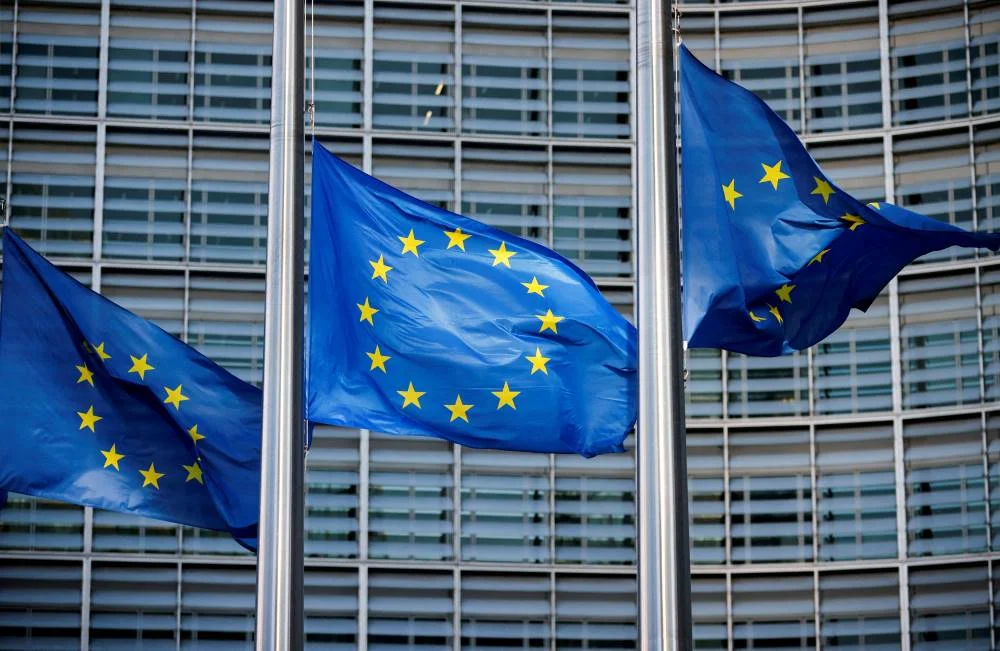- Web
- Feb 05, 2026
EU unveils new sanctions against Russia ahead of invasion’s third anniversary
-

- Web Desk Karachi
- Feb 20, 2025

BRUSSELS, BELGIUM: The European Union has agreed to impose a new round of sanctions against Russia on Wednesday, coinciding with the upcoming third anniversary of Russia’s invasion of Ukraine.
This agreement comes amid former President Donald Trump’s call for negotiations regarding Ukraine, raising questions about the sustainability of the EU’s stringent sanction policies.
Marco Rubio, Trump’s former secretary of state, indicated that Europe may eventually need to participate in discussions regarding sanctions relief for Russia.
“There are other parties that have sanctions; the European Union will need to be involved at some point because they have also imposed sanctions,” Rubio said on Tuesday following talks with his Russian counterpart in Saudi Arabia.
He said that any resolution would necessitate concessions from “all sides” and stated, when asked if Europe was being excluded, “No one is being sidelined.”
Despite these discussions, the EU is determined to continue its pressure on Russia for the time being. Ursula von der Leyen, the president of the European Commission, reaffirmed this commitment, stating, “We are committed to keep up the pressure on the Kremlin.”
The recent accord among ambassadors was strategically timed ahead of the third anniversary of the invasion, which the College of Commissioners plans to observe with a collective visit to Kyiv. This latest sanctions package marks the 16th set of restrictions introduced since February 2022.
Among the new measures is a ban on imports of Russian primary aluminum, a proposal that had been deliberated previously but faced approval hurdles from certain member states concerned about potential economic repercussions. Currently, Russian unwrought aluminum constitutes about 6% of the EU’s aluminum imports—a figure that has declined in recent years as European manufacturers have sought alternatives to Russian sources.
Previously, the EU had already prohibited certain aluminum products such as wires, tubes, and pipes from Russia, accounting for a small fraction of total imports. The new ban now encompasses primary aluminum, including ingots, slabs, and billets, which represent a significant portion of the import value.
Venezuela condemns new US and European sanctions
Beyond aluminum, the sanctions package also expands the blacklist against vessels belonging to Russia’s “shadow fleet,” which the Kremlin has been using to bypass Western oil trade restrictions and generate crucial revenue to sustain its military efforts in Ukraine.
This fleet comprises aging, uninsured ships suspected of engaging in deceptive practices, including transmitting false information, deactivating their transponders to evade detection, and conducting covert ship-to-ship transfers to obscure the origin of their oil shipments. Concerns regarding the dilapidated state of these vessels have prompted fears among European officials of potential oil spills that could lead to environmental disasters in the EU.
Political pressure surrounding these issues is intensifying, especially in light of recent incidents in the Baltic Sea, where the “shadow fleet” has been accused of sabotaging undersea cables. The exact number of ships in this fleet is estimated at around 600, although official figures are lacking due to the Kremlin’s tendency to withhold information.
Currently, China and India are the primary purchasers of Russian oil, with significant quantities often refined on their soil before being sold back to the EU under various labels. According to diplomatic sources, the latest round of EU sanctions has blacklisted 73 vessels linked to the “shadow fleet,” raising the overall total to over 150 ships, all of which will be barred from accessing EU ports and services.
Additionally, the legal text of the sanctions has been modified to allow for the blacklisting of the owners and operators of these vessels, including their captains. The new measures also include the expulsion of 13 Russian banks from the SWIFT electronic payment system and the suspension of broadcasting licenses for eight Russian media outlets. Formal adoption of these sanctions is anticipated during a meeting of foreign affairs ministers in Brussels on Monday.




